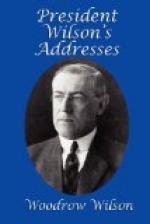Restrictions like these, adopted earlier in our history as a Nation, would very materially have altered the course and cooled the humane ardors of our politics. The right of political asylum has brought to this country many a man of noble character and elevated purpose who was marked as an outlaw in his own less fortunate land, and who has yet become an ornament to our citizenship and to our public councils. The children and the compatriots of these illustrious Americans must stand amazed to see the representatives of their Nation now resolved, in the fullness of our national strength and at the maturity of our great institutions, to risk turning such men back from our shores without test of quality or purpose. It is difficult for me to believe that the full effect of this feature of the bill was realized when it was framed and adopted, and it is impossible for me to assent to it in the form in which it is here cast.
The literacy test and the tests and restrictions which accompany it constitute an even more radical change in the policy of the Nation. Hitherto we have generously kept our doors open to all who were not unfitted by reason of disease or incapacity for self-support or such personal records and antecedents as were likely to make them a menace to our peace and order or to the wholesome and essential relationships of life. In this bill it is proposed to turn away from tests of character and of quality and impose tests which exclude and restrict; for the new tests here embodied are not tests of quality or of character or of personal fitness, but tests of opportunity. Those who come seeking opportunity are not to be admitted unless they have already had one of the chief of the opportunities they seek, the opportunity of education. The object of such provisions is restriction, not selection.
If the people of this country have made up their minds to limit the number of immigrants by arbitrary tests and so reverse the policy of all the generations of Americans that have gone before them, it is their right to do so. I am their servant and have no license to stand in their way. But I do not believe that they have. I respectfully submit that no one can quote their mandate to that effect. Has any political party ever avowed a policy of restriction in this fundamental matter, gone to the country on it, and been commissioned to control its legislation? Does this bill rest upon the conscious and universal assent and desire of the American people? I doubt it. It is because I doubt it that I make bold to dissent from it. I am willing to abide by the verdict, but not until it has been rendered. Let the platforms of parties speak out upon this policy and the people pronounce their wish. The matter is too fundamental to be settled otherwise.
I have no pride of opinion in this question. I am not foolish enough to profess to know the wishes and ideals of America better than the body of her chosen representatives know them. I only want instruction direct from those whose fortunes, with ours and all men’s, are involved.




